![[Modadugu Vijay Gupta] 이미지](http://sunhakpeaceprize.org/data/bbsData/16142472259.jpg)
2015 Laureate
- Modadugu Vijay Gupta
- A Pioneer of the Blue Revolution Who Found Alternative Solutions to the Future Food Crisis
As a fisheries scientist, Dr. Modadugu Vijay Gupta’s involvement in research spanning a period of five decades across several countries in Asia, Africa and the Pacific, dramatically increased fish production and laid the foundation for the Blue Revolution.
As a food resource that can provide high quality animal protein at relatively low-cost, cultured marine products has emerged as a possible solution to address the looming food crisis due to population increase and climate change-induced rise in food prices. Dr. Gupta spent his life developing environment-friendly aquaculture methods and technologies using agriculture wastes and by-products and enthusiastically organized and educated the poor in his methods of aquaculture benefitting small-scale farmers and addressing issues of poverty, nutritional deficiency, and resilience in South and Southeast Asia. Moreover, he taught aquaculture to women with low social status, which led to major improvements in women’s rights and empowerment. Despite threats to his own life, Dr. Gupta devoted himself to research in war-torn conflict areas as well and his efforts to develop low-cost methods of aquaculture have created a possible solution that can overcome the food crises as a result of the anticipated population explosion and impact of climate change.

Addressed the expected future food crisis due to climate change and led the Blue Revolution
Through field research and development of aquaculture methods and technologies suitable for the climate and environment of South and Southeast Asia, Dr. Modadugu Vijay Gupta brought about an explosive increase in aquaculture production known to us now as the Blue Revolution. Beginning in the 1960’s, Dr. Gupta had the insight that fish farming, which can provide animal protein at a relatively low cost, would be the key to solving humanity’s future food crisis, and he researched and developed compatible fish species that could thrive in both hot and humid climate and low-lying environment with seasonal floods. Especially from the late 1980’s, he identified fish species such as tilapia and silver barb that could thrive even in the turbid and shallow waters of Bangladesh.
As a result, Bangladesh's annual fish production in 1986, which was only about 170,000 tons when the research started, soared to about 850,000 tons when Dr. Gupta retired in 2004. Since 2000, Dr. Gupta started taking his research beyond Asia and has striven to develop aquaculture methods that can thrive in Africa, the frontline of world hunger.
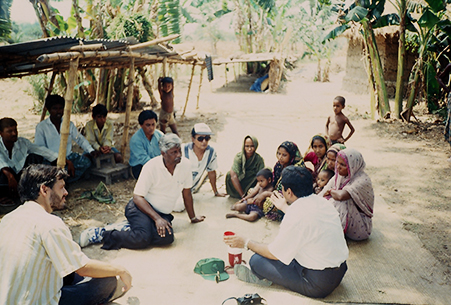
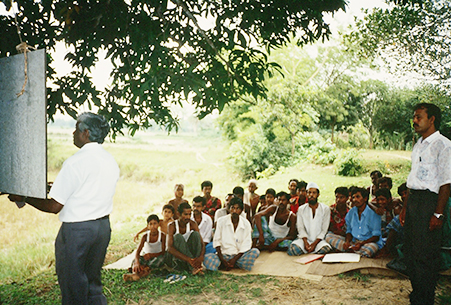
Brought the miracle of independence and self-sufficiency to the extreme poor through the spread of innovative aquaculture methods
Dr. Gupta is a saint of the South and Southeast Asian poor. Rather than give fish to the poor and hungry, Dr. Gupta taught them how to farm fish cultivating a miracle of independence and self-sufficiency. To address hunger and nutritional deficiency of the extreme poor in South and Southeast Asia, Dr. Gupta developed low-cost, high-efficiency methods of aquaculture and lived with the poor in their community devoting himself to passing on the methods to the poor. As a result, he not only greatly improved the nutritional state of the people living in a vicious cycle of extreme poverty and hunger but also instilled in them the hope for a better life.
In the 1970’s, India was focused on developing high-end, high cost aquaculture methods such as shrimp farming. However, during this period Dr. Gupta’s focused on researching aquaculture methods for the extreme poor and marginal farmers. He developed methods such as fish polyculture, which is the culturing of a diversified mix of fish species in one pond, and integrated aquaculture-agriculture, which combines aquaculture and agriculture in an eco-friendly way.
Furthermore, Dr. Gupta built partnerships with local communities and worked tirelessly to teach his methods to the poor. Starting with small groups of 5~10 landless poor farmers each, he motivated them and taught them aquaculture skills. Afterwards, Dr. Gupta helped create a basis for the farmers’ economic independence through fish farming in leased ponds with unconditional financial support for the start-up costs for fish farming.
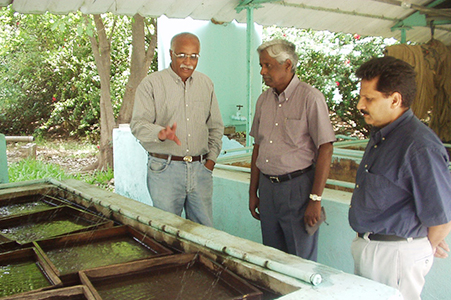
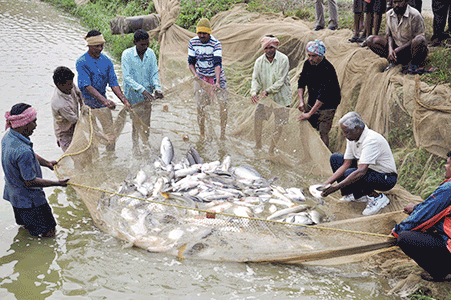
Significantly improved the social status and rights of Asian women
Dr. Gupta spread aquaculture methods to South and Southeast Asian women who held low social status, which resulted in not only increased household incomes and better nutrition but also drastic improvement in the women's social status and rights. Recognizing that some women in South and Southeast Asian countries have no income because they do not participate in economic activities and have lower social status than men, Dr. Gupta created opportunities for women to participate in economic activities. He personally persuaded religious leaders who were negative towards women’s participation in society to allow women to participate and motivated poor women farmers to become self-sufficient and educated them on the basic skills required for aquaculture.
In addition, Dr. Gupta cooperated with local organizations so that women could receive the funding and land necessary for their economic activities. These initiatives were such a great success that now women form a considerable part of the fish farming work force, and this has brought positive changes that have improved women’s rights and status both within the household and in society.
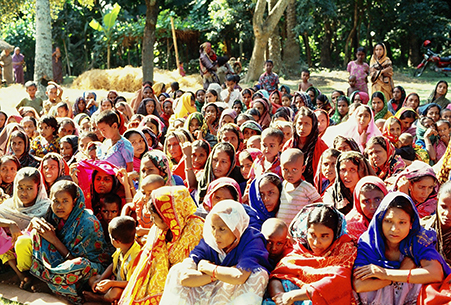
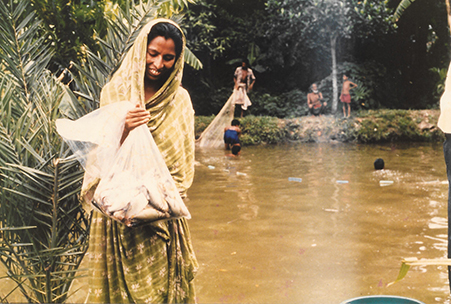
![[Modadugu Vijay Gupta] 이미지](http://sunhakpeaceprize.org/data/bbsData/16142472259.jpg)
Modadugu Vijay Gupta
- Born
- August 17, 1939
- Country
- India
- Awarded for
- Pioneering the blue revolution and investing his life in developing aquaculture as an alternative solution to the future food crisis
Academic Background
2007 Ph.D. in Biology, University of Calcutta, India
2007 Honorary doctorate degree, Central Institute of Fisheries Education, India
2008 Honorary doctorate degree, G.B. Pant University, India
Professional Background
1962 - 1971 Assistant Research Officer, Indian Council of Agricultural Research (ICAR)
1971 - 1977 Scientist, ICAR
1977 - 1981 Economic and Social Commission for Asia-Pacific (UN-ESCAP), Fish Breeding Expert, Mekong Secretariat (Lao PDR)
1981 - 1985 Economic and Social Commission for Asia-Pacific (UN-ESCAP) Senior Aquaculture Scientist, Mekong Secretariat, Thailand
1985 - 1986 Senior Fish Farm Management Scientist and Project Leader, Mekong Secretariat, Lao PDR
1986 - 1989 Fish Culture Specialist/Officer-In -Charge, UN Food and Agriculture Organization (UN-FAO), Bangladesh
1989 - 1996 Senior Aquaculture Specialist/Officer-In-Charge, WorldFish Center (CGIAR) in Bangladesh, Malaysia, Philippines
1989 - 2008 Implemented/coordinated projects and programs in over 20 countries in Asia, Africa and the Pacific
1996 - 2000 Director, International Relations, WorldFish Center (CGIAR) Research Coordinator, International Network for Genetics in Aquaculture (INGA), initiating aquaculture genetics research projects in Bangladesh, China, Ivory Coast, Egypt, Fiji, India, Indonesia, Malawi, Malaysia, Philippines, Thailand, Vietnam, etc. that resulted in a number of improved strains of fish
2000 - 2004 Director General, International Relations and Partnerships, WorldFish
2005 Present Dr. Gupta’ advisory services were taken advantage by a number of international organizations such as: The World Bank; The Asian Development Bank; United Nations Development Program (UNDP); Commonwealth Secretariat, Food and Agriculture Organization of the UN (FAO); Mekong River Commission; Danish International Development Agency (DANIDA); London; United States Agency for International Development (USAID); Agriculture Research Center of the Netherlands for their programs in different countries of Asia and Africa
Awards
1978 Outstanding team research in developing low-input, high output aquaculture methods
2005 World Food Prize (World Food Foundation)
2007 Gold Medal (Asian Fisheries Society)
2009 Honorary Life Member Award (World Aquaculture Society)
2010 Eminent Agriculture Scientist Award (Government of Andhra Pradesh, India)
2015 Nutra India Summit Life Achievement Award (Nutra India Summit)
Commemorative Books
![[Modadugu Vijay Gupta] images](http://sunhakpeaceprize.org/data/bbsData/161467267999.jpg)
Modadugu Vijay Gupta
- Planning & Editing
- Sunhak Peace Prize Secretariat
- Publishing House
- MIRAE BOOK
- Issued
- February 1, 2016
-
- Table of Contents
-
Dr. Gupta’s accomplishments for food peace
Watching fishermen at sea
Beginning aquaculture research
Bringing the Blue Revolution to Laos
Welcoming bigger challenges in Bangladesh
Achieving success with humility
Developing environmentally friendly integrated aquaculture technology
Creating a foundation for self-sustainability
Changing the lives of oppressed women
Farmer-oriented, field-oriented



